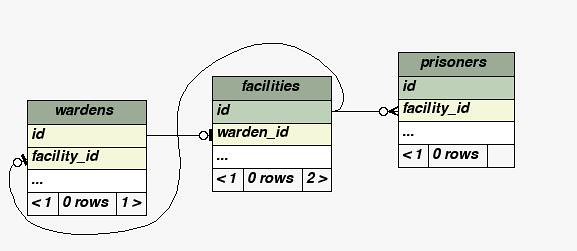ActiveSchema
ActiveSchema makes ActiveRecord a bit DRYer. It discovers associations, such as belongs_to and has_many, using foreign keys, and it adds validations to ensure constraints on data, like NOT NULL and maximum length, are honored.
An example
If you have a table structure like this (arrows indicate foreign keys)

ActiveSchema would link your models like below
class Prisoner
belongs_to :facility
end
class Facility
has_many :facilities
belongs_to :warden
end
class Warde
has_one :facility
end
Usage
Put
gem 'activeschema'
in your Gemfile.
ActiveSchema can be enabled per model, or you can choose to make it available everywhere.
Either way, it must be activated by the active_schema class method. Per model:
class Model < ActiveRecord::Base
active_schema
end
In ActiveRecord::Base:
class ActiveRecord::Base
active_schema
end
Foreign key support by ‘foreigner’
Foreign key information is extracted by the Foreigner library. It has out-of-the-box support for MySQL, Postgresql, and SQL2003.
Rails 3 and Ruby 1.9.2
ActiveSchema has only been tested on Rails 3 and Ruby 1.9.2. It may work elsewhere, but there really is no guarantee.
Preloading the associations
The speed at which MySQL supplies foreign key information can, at times, be leisurely, to say the least.
To circumvent this, ActiveSchema supports foreign key extraction without hitting the database. Instead, it reads the information from the dumped “schema.rb” file, which of course must be current.
Adjusted configuration:
schema_feeder = ActiveSchema::SchemaFeeder.new
schema_feeder.read("path/to/schema.rb")
ActiveSchema.configure do |c|
c.feeder = schema_feeder
end